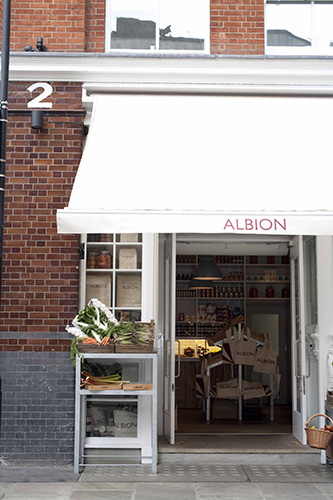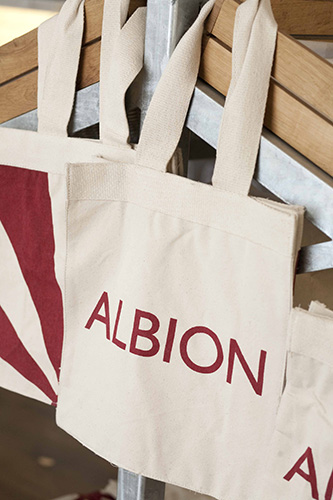Perfidious Albion: A restaurant review.

Albion
2-4 Boundary Street
Shoreditch
London E2 7DD
www.albioncaff.co.uk
On arrival at Albion you will encounter shelves and tables artfully piled with flawless produce and other good things to eat. The place positions itself as a neighborhood resource, and indeed Albion opens every day and its shop stays up late. Prices however are high, even if you have come to existential terms with Dean & Deluca. Speaking of which, The New York Times inexplicably has labeled the arrangement at Albion ‘twee’ on the basis that most of the goods, including teas and sauces, are British, but this, after all, is a Conran creation. This is London, Shoreditch no less, and Albion is nothing if not cutting edge, at least in its ironic atmosphere and choice of cuisine. It is elegantly spare, all hard edges and bright lights and not at all unappealing in prospect. Albion is noisy but not loud; tables elbow their neighbors but ceilings are high and the open kitchen was almost hushed during our visit, so Ramsay need not apply, although they could have used him for purposes disciplinary as well as culinary.
From the name you would expect the food to be English and you would be right. It is, however, a subset of the species, an ironic update, just like the décor, of what you might muse you could find in the sort of austere café (the ‘caffs’ of lore, venerated by those with sufficient funds to avoid them) offering plain fare to the working class back in the day. This kind of place, as incarnated by Albion, never really existed in this way, but then neither did the taverns at Colonial Williamsburg.
Albion is egalitarian; the web address is ‘albioncaff’ and you cannot book. You can, however, linger over your tea and nothing more at a table up front, go for a snack or dessert, and not cause a stir. Service aspires to the aloof. It was, however, rushed until we requested our bill, which arrived in the blink of an eon. Our waitress from France, incongruously called Francesca, dutifully fulfilled our fantasy of the noxious Parisian, and appeared to wish that she were there, or anywhere but waiting table at Albion.
The menu is short to the point that claiming someone would need to master it would be like describing Rick Perry as intellectually overbearing. It takes a sullen genius to know nothing about very little, and Francesca passed the test. If you doubt us, eavesdrop on the following exchange: “What is the British charcuterie?” “Meat.” “Who makes it? “The English.” What kind of meat do they use to make it?” “English meat.” “What kind of ‘English meat?’” “It is cold.” And so on. (After a while it became kind of fun; our own ironic game of allusive postmodern misdirection.)
Europhiliac Scots take note: Over three centuries after the Act of Union created the United Kingdom, Europeans still tend to conflate England with Britain. Nicholas Sarkozy, another person of French extraction, recently made the same mistake as Francesca.
After sampling the ‘English meat’ we had learned little more about it. The various cuts must have been pork but might have been anything at all; they did not taste like much, once again reflecting a sort of perverse genius. Perhaps if we had sampled the charcuterie in greater quantity we might at least have sensed some salt, but the scatter of skinny coins that pocked our plates gave us little chance. Steep fare at £8.
Even grilled cheese made with Kraft American ‘cheese food product’ can assuage an anxious soul, which demonstrates the difficulty of trying to render boring a Welsh rabbit stoked with beer and spice. At least it must turn out salty, satisfying and rich, right? Not at Albion, which managed this challenge as well, to make a rabbit that mimicked ‘Seinfeld,’ the show about nothing. Perhaps they used an unfatted ‘cheese’ subsitute. Shifting our theme, it would have been easy for the staff to drizzle dressing on our greens, but the notion escaped them.
But for Francesca, all could have been forgiven upon arrival of the kidneys in the midst of our Spartan starters. They were perfect, sliced in a devilish sauce, tangy but not overwhelming. The kidneys themselves were properly assertive but not unpleasantly strong, cooked so they snapped but not runny with blood. This was comfort food of a high order, devoured with thick chips that produced equal delight, and merely 75p more than the miserly ‘English meat.’
Did we mention bread? Albion bakes its own, and if it is not exclusively English, it is good and you can buy it from the shop. For only £6 more, they sell a sturdy and striking canvas tote to carry it away, evidence that the Conrans have not lost their high concept touch.
Albion, then, is neither notably expensive nor good value; some things (the kidneys, chips at £3.50) are bargains but other price points (the ‘meat’) are severe. Our wine, a Corbiere listed of course under ‘RED’ (the Editor: “What is it like?” Francesca: “It is red.”) was inferior to the one we drank the following evening at Rowley Leigh’s Café Anglais, a considerably plusher establishment that charged £5 less for it than Albion charged for theirs. No draft beer at either place (too sloppy for the pristine aesthetic; attitude over alimentation).
Should you go to Albion? Probably not. Reasonable alternatives in Shoreditch include both the Fox and The Princess and they pump cask ale; we prefer The Princess on aesthetic (the stunning staff) and culinary grounds; better beer too, including hard to find ales and porter from Meantime at the prime meridian.
Service of course was embedded in the bill, which demonstrates (proving a negative!) the power of incentive and saved us from an awkward parting.


